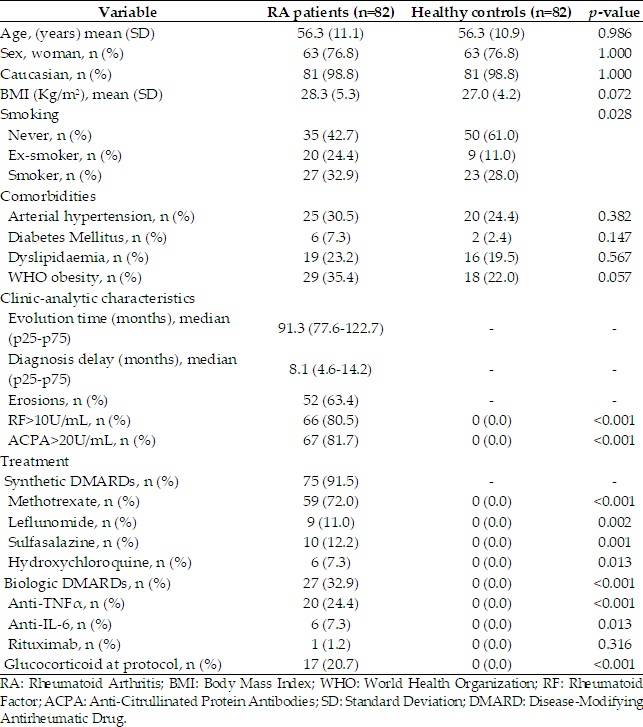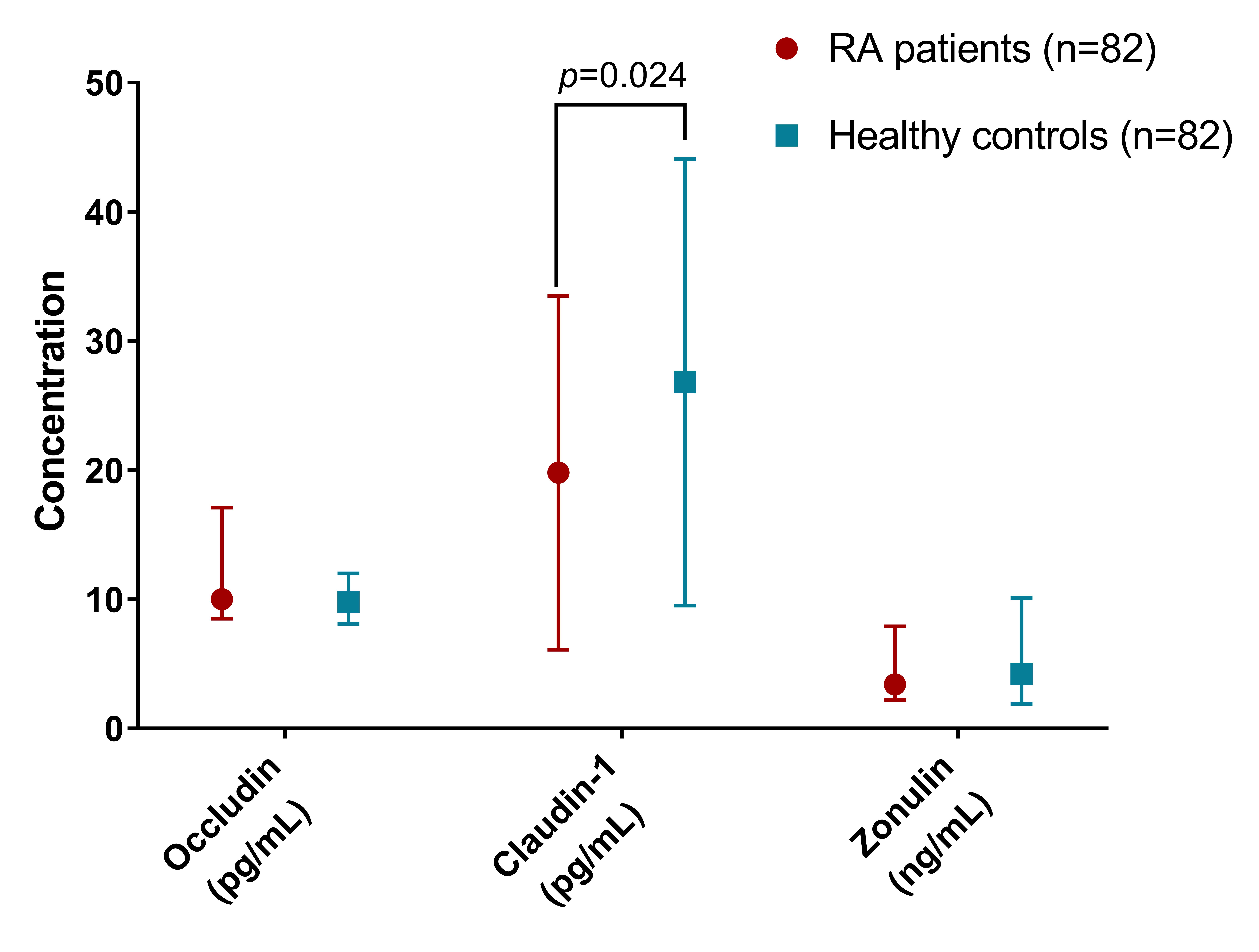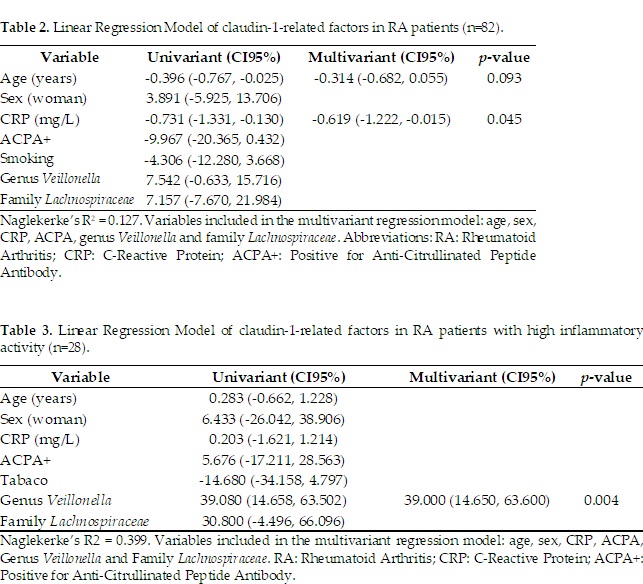Session Information
Session Type: Poster Session A
Session Time: 10:30AM-12:30PM
Background/Purpose: The etiology of Rheumatoid Arthritis (RA) is not fully understood. Recent studies point to intestinal permeability as an important factor in the establishment and development of RA. Tight junction (TJ) proteins play a major role in intestinal homeostasis. The alteration of this homeostasis has been related to RA. Furthermore, RA patients present dysbiosis and a lower microbiota diversity compared to healthy individuals. However, the data regarding the underlying mechanisms of the intestinal permeability-gut microbiota-tight junction proteins-RA axis are lacking.
Purpose: To quantify the TJ proteins in feces of both RA patients and healthy controls, study the relation between TJ proteins concentration and gut microbiota, and identify potential biomarkers of RA.
Methods: A cross-sectional study including RA patients (ACR/EULAR 2010 criteria) and sex- and aged-matched healthy controls. The quantification of TJ proteins was carried out by ELISA; specific commercial kits were used (Occludin, CSB-EL016263HU, Cusabio; Claudin-1, CSBEK005490HU, Cusabio; and Zonulin, CSB-EQ027649HU, Cusabio). Gut microbiota was evaluated by NGS platform Ion Torrent S5 and the obtained sequences were processed by Quantitative Insights Into Microbial Ecology 2 software. The inflammatory variables analyzed were DAS28-ESR, CRP, inflammatory cytokines (IL-6, IL-1, TNF-α) and oxidized LDL. Descriptive analysis, Pearson’s χ2 test, t-test or Wilcoxon test, Pearson correlation coefficient, and multiple linear regression were carried out.
Results: A total of 164 individuals were included in the study: 82 RA patients and 82 healthy controls. Table 1 shows the main clinical and demographic characteristic: 76.8% were women with an average age of 56.3±11.1 years. RA patients presented an average DAS28-ESR value of 3.0, average CRP of 3.4 mg/L and 35.4% of them were classified as obese. Only claudin-1 showed significant differences (RAmean: 19.8±13.7pg/mL vs. Controlmean: 26.8±17.3pg/mL, p=0.024) (Figure 1). Results evidenced a correlation between claudin-1 values and both age (Spearman’s rho: -0.317; p< 0.05) and BMI (Spearman’s rho: 0.326; p< 0.05), and between zonulin values and both CRP (Spearman’s rho: 0.326; p< 0.05) and TNFα (Spearman’s rho: 0.326; p< 0.05). Multivariant analysis (Table 2 and 3) showed that claudin-1 and CRP levels are related in RA patients (β: -0.619; p: 0.045), and subgroup of patients with RA who had not achieved clinical remission the abundance of genus Veillonella is positively associated with claudin-1 levels (β: 39.000; p: 0.004).
Conclusion: RA patients are likely to show altered intestinal permeability compared to healthy controls due to decreasing claudin-1 levels. Moreover, CRP levels are inversely associated with claudin-1 levels, which suggests a possible role of inflammation in claudin-1 regulation in RA. In addition, TJ proteins in stool are correlated with RA clinical parameters, supporting a potential use as biomarkers in RA context. Finally, our results suggest that claudin-1 could be a cause of the dysbiosis observed in RA patients.
Red: RA patients; blue: healthy controls. Data are shown as mean ± standard deviation for claudin_1, and median (p25-p75) for occludin and zonulin. Significance level: p≤0.05
To cite this abstract in AMA style:
Mucientes A, Lisbona-Montañez j, Ruiz-Limón P, Manrique-Arija S, García-Studer A, Ortiz-Márquez F, Mena Vázquez N, Fernández-Nebro A. Impact of Tight Junction Proteins on Inflammatory Processes and Microbial Imbalance in Rheumatoid Arthritis [abstract]. Arthritis Rheumatol. 2024; 76 (suppl 9). https://acrabstracts.org/abstract/impact-of-tight-junction-proteins-on-inflammatory-processes-and-microbial-imbalance-in-rheumatoid-arthritis/. Accessed .« Back to ACR Convergence 2024
ACR Meeting Abstracts - https://acrabstracts.org/abstract/impact-of-tight-junction-proteins-on-inflammatory-processes-and-microbial-imbalance-in-rheumatoid-arthritis/



